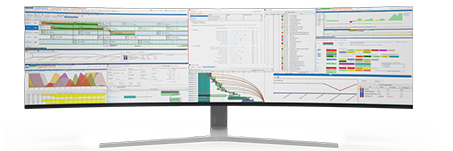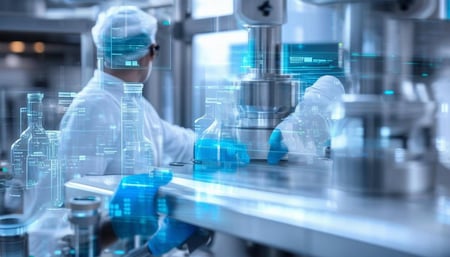Production with Artificial Intelligence and Virtual Processes
The demand for efficiency and precision in production scheduling has never been higher. As a Production Scheduler in a pharmaceutical manufacturing facility, you understand the critical role scheduling plays in meeting production targets, ensuring regulatory compliance, and ultimately delivering life-saving medications to patients worldwide.
In recent years, advancements in technology, particularly artificial intelligence (AI) and virtual processes, have revolutionized the way pharmaceutical manufacturing facilities operate. These technologies offer unprecedented opportunities to optimize production scheduling, streamline operations, and enhance overall efficiency.
In this blog post, we will explore the integration between leading production scheduling software like PlanetTogether and enterprise resource planning (ERP) systems such as SAP, Oracle, Microsoft, Kinaxis, and Aveva, and how the synergy between AI and virtual processes is transforming the pharmaceutical manufacturing landscape.

The Evolution of Production Scheduling in Pharmaceuticals
Traditionally, production scheduling in pharmaceutical manufacturing has been a complex and labor-intensive process. Schedulers relied heavily on manual methods, spreadsheets, and rudimentary software solutions to create schedules, often resulting in inefficiencies, production bottlenecks, and missed deadlines.
However, the advent of AI and virtual processes has heralded a new era in production scheduling. These technologies leverage vast amounts of data, sophisticated algorithms, and machine learning capabilities to analyze production variables, predict outcomes, and generate optimized schedules in real-time.


Integration between PlanetTogether and ERP Systems
One of the key challenges faced by Production Schedulers is the seamless integration of scheduling software with ERP systems. ERP systems like SAP, Oracle, Microsoft Dynamics, Kinaxis RapidResponse, and Aveva MES play a central role in managing critical production data, inventory levels, resource allocation, and supply chain logistics.
The integration between PlanetTogether, a leading production scheduling software, and these ERP systems offers several benefits:
Real-time Data Synchronization: Integration allows for seamless data exchange between scheduling software and ERP systems, ensuring that production schedules are based on the most up-to-date information.
Enhanced Visibility and Collaboration: Production schedulers, production managers, and other stakeholders gain real-time visibility into production schedules, resource availability, and inventory levels, facilitating better collaboration and decision-making.
Optimized Resource Utilization: By integrating scheduling software with ERP systems, production schedulers can optimize resource utilization, minimize downtime, and improve overall equipment effectiveness (OEE).
Automated Workflows: Integration enables the automation of routine tasks, such as order processing, inventory management, and production scheduling, freeing up schedulers to focus on strategic activities.

Leveraging Artificial Intelligence for Intelligent Scheduling
At the heart of modern production scheduling solutions lies artificial intelligence. AI algorithms analyze historical production data, identify patterns, and predict future demand, allowing schedulers to anticipate bottlenecks, allocate resources efficiently, and optimize production schedules.
By harnessing the power of AI, production schedulers can:
Predictive Maintenance: AI-powered predictive maintenance algorithms anticipate equipment failures before they occur, allowing maintenance teams to schedule repairs during planned downtime, minimizing production disruptions.
Demand Forecasting: AI algorithms analyze historical sales data, market trends, and external factors to forecast future demand accurately, enabling production schedulers to adjust production schedules in advance to meet customer needs.
Dynamic Scheduling: AI-powered scheduling solutions continuously analyze real-time production data, adjust schedules dynamically based on changing conditions, and optimize resource allocation to maximize efficiency and minimize costs.
Scenario Planning: AI-driven scenario planning tools allow production schedulers to simulate various production scenarios, assess the impact of different decisions, and identify the most optimal course of action.

The Role of Virtual Processes in Pharmaceutical Manufacturing
Virtual processes, such as digital twins and simulation models, are revolutionizing pharmaceutical manufacturing by providing a digital replica of physical assets, processes, and systems. By creating virtual representations of production facilities, equipment, and workflows, pharmaceutical companies can simulate production scenarios, test process improvements, and optimize operations without disrupting actual production.
The integration of virtual processes with AI-powered production scheduling solutions offers several advantages:
Optimized Process Design: Virtual process simulations enable pharmaceutical companies to design and optimize production processes before physical implementation, reducing time-to-market and minimizing costly errors.
Predictive Performance Analysis: Digital twins allow production schedulers to predict the performance of production equipment, identify potential bottlenecks, and optimize production schedules to maximize throughput and efficiency.
Continuous Improvement: By leveraging virtual processes, pharmaceutical companies can continuously monitor and optimize production workflows, identify areas for improvement, and implement process enhancements to drive operational excellence.
As a Production Scheduler in a pharmaceutical manufacturing facility, embracing artificial intelligence and virtual processes is key to unlocking new levels of efficiency, agility, and competitiveness.
By integrating leading production scheduling software like PlanetTogether with ERP systems such as SAP, Oracle, Microsoft Dynamics, Kinaxis RapidResponse, and Aveva MES, and leveraging the power of AI and virtual processes, pharmaceutical companies can streamline production operations, optimize resource utilization, and accelerate innovation.
In the dynamic and rapidly evolving pharmaceutical industry, staying ahead of the curve requires embracing transformative technologies that empower production schedulers to make data-driven decisions, adapt to changing market conditions, and deliver life-saving medications to patients around the world. By harnessing the synergy between AI and virtual processes, the future of pharmaceutical production is brighter than ever before.
Are you ready to take your manufacturing operations to the next level? Contact us today to learn more about how PlanetTogether and integrated scheduling solutions can help you achieve your sustainability goals and drive success in the pharmaceutical industry.